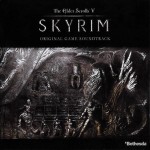It was only a matter of time before the great film composer, Hans Zimmer, decided to get involved with game music. After all, video game composers have been imitating his style for years. If not Zimmer’s scores directly, then the works of other members of his Remote Control Productions team (i.e. Steve Jablonsky, James Dooley, Geoff Zanelli, Harry Gregson-Williams, Mark Mancina, John Van Tongeren and John Powell).
We all know Zimmer’s body of work. Whether it be the recent Batman films or the early Bruckheimer films like The Rock or Crimson Tide, we know he can score the pants off of films. But how well does his work translate to gaming? Does Hans Zimmer own the small screen as well as the silver screen? Click the jump to find out!
With all the rather negative talk in the gaming music business about how game scores have “lost their way/voice” in favor of film scores, Demon’s Souls unsheathed its mighty musical sword and slayed our doubts. Atlus’ insanely difficult RPG reminded us all that video game music is – in fact – its own genre, and with a vengeance. We celebrated. While basking in the glow of a new voice in game music, Hans Zimmer’s Modern Warfare 2 stealth bomber flew overhead and bombed the bejesus out of us.
Upon my first experience listening to this score, I heard the voices of all of my fellow gamers screaming in agony over just how film-score like this piece is. I realized that I was playing what is essentially a Michael Bay action film (Heck, there are even scenes lifted from The Rock.). Why shouldn’t a game that’s trying to be like these films have their score?
However, Modern Warfare 2’s soundtrack is not a game soundtrack. It is a bombastic, thrilling, screen-eating movie score. It is not Zimmer’s greatest work, but is certainly a nice addition to his portfolio.
Unlike a lot of his earlier action film scores (The Rock, Crimson Tide), Modern Warfare 2’s main theme does not possess the same lyric, singable quality. It is a more complex, and slightly longer theme – very unlike a game score. Naturally, Zimmer’s score reflects the various locales featured throughout the game such as Brazil, Russia, etc. using traditional-sounding instruments commonly found there. Like many film composers have shared, one of the challenges of composing a game score is that it must often be more ambient and less theme-driven, as the repetition of the themes will be overwhelming to the player (i.e. Gears of War 2 – though a great theme). In this respect, Zimmer scores a direct hit. I never felt the score get in the way of the action and often felt energized by it. It became obvious very quickly that Hans Zimmer was not bothered by the transition of mediums and delivered the same high-powered drama as his film scores. Though Harry Gregson-Williams Call of Duty 4: Modern Warfare score was a bit understated in its main theme and presentation, Hans Zimmer’s score is not subtle and does not take prisoners.
Hans Zimmer’s explosive entrance into the world of gaming music is perhaps the sharpest double-edged sword the industry has experienced. On the one hand, one could argue it represents the official marrying of game music to film music and – subsequently – the death of game music. Here we have the most successful film composer since John Williams scoring the year’s biggest game (perhaps the best-selling title of all time) and – quite frankly – not making it sound a stitch different from his other film scores. On the other hand, perhaps Hans Zimmer’s contribution has legitimized gaming and game music and brought it up to a level of mainstream acceptance and respect the likes of which this industry has never experienced. I am in the latter camp.
Tags: Call of Duty, Call of Duty 4: Modern Warfare, Hans Zimmer, Harry Gregson-Williams, Modern Warfare, Modern Warfare 2, Reviews, Steve Jablonsky, Videogame









































[…] Original Sound Version » Blog Archive » Modern Warfare 2: Hans Zimmer Throws Us a Tactical Nuke http://www.originalsoundversion.com/?p=5885 – view page – cached It was only a matter of time before the great film composer, Hans Zimmer, decided to get involved with game music. After all, video game composers have been imitating his style for years. If not… Read moreIt was only a matter of time before the great film composer, Hans Zimmer, decided to get involved with game music. After all, video game composers have been imitating his style for years. If not Zimmer’s scores directly, then the works of other members of his Remote Control Productions team (i.e. Read less […]
Lorne Balfe composed all the game music, Hans only did the main theme. and I don’t see Lorne Balfe’s name in your article.
This was an interesting article. As much as I hate to point out the divide, I think that the different approaches to game design/philosophy between Japan and the West contribute greatly to the type of music associated with said games. To keep things in context, two war-based games: Metal Gear Solid and Gears of War 2.
As I said in my little write-up elsewhere, I found the Gears of War 2 music I heard live to be neither impressive nor memorable compared to game music that has ‘character’: for example, Metal Gear Solid (which I’ve never played — honest!). But I also noted that ‘being memorable’ was not the function of Jablonsky’s score.
I think one of the keys to the differentiation is found not in game music vs. movie music, but in the style of the game scored. I did play a little Call of Duty 4 (just single player) and there’s no denying it feels like playing a movie — but not one with distinct dramatic characters or emotional pivots. I am going to presume that MW2 is not all that different and that the genre hasn’t suddenly started giving deeper psychological values to the various characters. So ultimately what is being scored is not the ‘story’ but the ‘scenes’. And I, for one, am far less likely to engage with that sort of music in and of itself than something that expresses more than just bullets flying and things going boom.
The counterpoint is that I love Zimmer’s work, but give me his The Power of One, The Lion King, Thelma & Louise, Prince of Egypt, Rainman or True Romance over The Rock, Crimson Tide or Gladiator *anyday*. Zimmer himself stated that with Gladiator he unashamedly put on his Wagner hat for Commodus’ triumphant return to Rome. That’s about as lyrical as his more bombastic moments might get. It’s not that I feel Zimmer shouldn’t be scoring games — I think it’s a great thing that this ‘marriage’ has been initiated, after what I think has been a too-long engagement. Hokoyama’s AFRIKA and McCreary’s forthcoming ‘Dark Void’ both indicate a benevolent, progressive outcome of the merger.
So I’m not sure what to make of the claim that such a union would result in the death of one of the spouses. At the risk of beating the metaphor with a dead horse, as much as marriage symbolises the end (death) of one lifestyle, naturally it is the start of a new one. No one actually dies. Usually. Well, let’s just hope that the power balance in this relationship won’t turn game music into a subservient yes-dear-no-dear housewife to movie music as the belligerent slob of a husband… 🙂
After all, there are plenty of movie soundtracks I enjoy listening to with only the barest of associations to the movie itself — which is my primary criterion for judging worthy game music as well.
@Joe Paulino: Thank you for your interest in the review. Without any disrespect to Mr. Balfe, Hans Zimmer is credited as the composer of all the main themes (not just one) and is the producer of the soundtrack (according to his website). If you’ll notice, my piece spoke primarily of the main themes. Additionally, the promotional copy received had no liner notes and listed only, “Music Composed By Hans Zimmer”. This is what we had to go on at the time of the review. Your point, however, well taken. Thanks for reading!
A question about the soundtrack: does it feature the full opening theme (from the first opening scene, the one featuring green lines around the world) without voices and SFX?